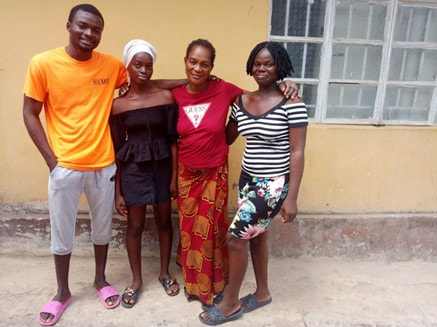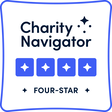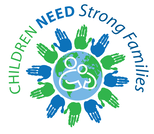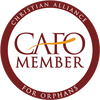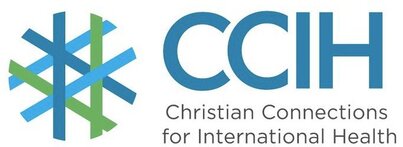|
Meet Cathleen and her Family: The CRC enrolled them into its program in 2018 following the untimely death of the father. As a suddenly single mom, Cathleen had not been engaged in any type of work when she lost her husband, and she struggled to find enough money to care for her three children on her own. Although school in Sierra Leone is “free,” families are responsible for providing uniforms and school supplies and faced with the choice between these expenses and feeding her family, she was forced to focus on food. However, when she heard about the program at the CRC, she decided to pay a visit to find out if her family could qualify to receive some support to help her get her family on their feet. Quickly, the family was assessed, and their immediate needs addressed; all three children were outfitted and enrolled in school, and over the years, the family’s medical needs have been addressed by Mercy Hospital, through referrals made by their CRC Case Manager. In a follow up inerview with Cathleen, she expressed how supporters like you changed her family for good. "The support from the CRC came in at the time we needed it the most. It changes everything. Looking at the way my family was struggling, I thought those days of joy would never come back. Honestly, my hope was getting weaker every day until you came along. My family got a fresh start. Our hope was renewed. I'm forever grateful.” Thanks to the support of the CRC, and the care provided by their case Manager, Abie Ruth, Cathleen’s children are all in school and thriving. Memunatu is the leader of her 8th grade class. Umaru has just completed his Technical Diploma in Accounting, and Juhanatu is currently in her second year of Nursing school at Njala University. But the CRC did much more than just step into the gap where Cathleen couldn’t provide, they worked to empower Cathleen to be able to provide for her own family. This year, she attended the CRC’s microfinance training program, where she learned how to manage a simple household budget. She completed the course and was awarded a microloan, which she used to start a business selling shoes in the Bo market, and she’s doing quite well. Abie Ruth is working with Cathleen, helping her to make plans to continue to grow stronger both personally and financially so that soon she will be able to provide for herself and her family without CRC support. The CRC program and its focus on family strengthening seeks not only to step into dire situations where people are literally struggling to get enough food to eat, but to build the capacity of the family to become independent and self-sufficient; bringing dignity and hope not only to them, but to others in their community as well. Thank you for keeping the joy flowing for more vulnerable families and children. Your gift today, no matter the size, will equip families, renew their hope, and help them stay together and thrive. Will you give a gift of change today?
0 Comments
A parable: A town had a massive cobra problem. The cobra population had gotten so huge that they were everywhere, attacking people and causing traffic jams and other problems. The Government had a great idea - they offered to pay anyone who could bring them a dead cobra - a certain amount per dead cobra. Problem solved, right? Well, no. Smart people began creating cobra farms, breeding cobras and then killing them to sell to the government, and cobra farmers started to do really well for themselves. Eventually the government catches on, and they ended the money for dead snakes program. The cobra farmers had a new problem. They had all of these cobras that no one wanted, that needed to be fed and cared for. So they released them. Now the town had twice the number of cobras it had had BEFORE the government had launched its money for dead snakes initiative. We don't always understand the unintended consequences of our actions, especially if we are focused on addressing just what we can see on the surface. Did anyone ask, 'why are there so many cobras?' Could anyone with expertise in the geography, mating and nesting habits of cobras, climate of the region, natural predators of cobras, etc. have come up with a better solution? Or were they just too focused on fixing the problem immediately in front of them? We are incredibly grateful for the generosity and engagement of our donors. Their support allows us to make a real difference in the lives of the people we serve. We are constantly amazed by the outpouring of support we receive, and we are so appreciative of the trust that our donors place in us. We know that there are many worthy causes out there, and we are honored that our donors have chosen to support our work. We are also so grateful for the donors that reach out to us that want to do more. However, while that desire to do more is good, the way it is approached can sometimes have unintended consequences. For example, there may be an FEA Advocate who donating every month to the program that is strengthening family. And they may wonder, "how could I do a little more for this family I have come to care about and have a connection with? Could I send a gift to the family I'm an Advocate for?" Or maybe someone in Sierra Leone is connected to this Advocate on social media, and they've let the Advocate know there is a specific thing they'd really like to have, or that might make things easier for them. Or perhaps you traveled on a mission team to Sierra Leone, and you've noticed something you think could really help - new medical equipment for the Hospital for example. Or you met a patient who needs an ongoing treatment not usually covered by the hospital. We get questions like these all the time, because our donors and Advocates are fantastic people who have a heart for our mission. You may have read this list of examples and thought to yourself, " Yes, I want to do more to help vulnerable children and families. Can I send HCW a donation to do more outside of what I already support?" Well, the answer may surprise you. While we want to enable our donors to support the causes they care about, it's a little complicated by US tax code. As a 501c3 non profit organization, HCW cannot accept a donation that is designated for a specific child, person, family, or even staff member at our partner's programs in Sierra Leone. When you make a donation to a nonprofit like HCW, that donation is tax deductible, for you. However, to be tax deductible, a donation must be a pure gift available to a qualified charity. A gift is deemed deductible by the IRS if (1) it is complete and irrevocable (no "strings attached") and there are no conditions on use, (2) there is no personal benefit to the donor (the IRS looks at those more as a purchase), and (3) there are no 'earmarks' on the gift - in other words, donors cannot stipulate an 'ultimate beneficiary.' Basically, this means that the recipient/donee has free use of the donation within its stated charitably objectives. This is true not just for us, but for every nonprofit organization in the United States. It's important for donors to follow these guidelines in order to be able to take a tax deduction for a donation made to HCW's program partners. It's even more important for HCW to follow these rules as failure to do so could mean revocation of our tax status, fines, or even criminal prosecution. Aside from the fact that the IRS doesn't let us do that, it's also not great practice, as it can inadvertently put the donor in between the professionals on the ground in Sierra Leone, and the people they're trying to serve. When donors dictate how the funds should be utilized or what specific projects they should support, they can inadvertently constrain the organization's ability to make informed decisions based on their expertise and the needs of the community they serve. Let's look at the CRC, for example. When children or families make specific requests to donors or Advocates, or donors offer to give specific things to them, they're not bringing their concerns to the case manager, the trained professional. These social workers know how to work with the family to ascertain their needs, know what other resources they may have within their extended family and in their wider community that they can draw on and depend on long-term. They have the professional expertise to assess the families' real and felt needs, and make appropriate recommendations for support to the CRC Care Panel, who determines what needs are met and for how long. Most importantly, they have the "big picture" about a family's past and present situation, the circumstances around them, and the goals they have for the future, so they're in a much better position to know how to really help. Therefore, donors should trust the CRC's expertise and allow them to utilize resources in the most impactful manner. This will ensure that a donor's generosity truly aligns with the long-term goals of the family. It's a little different at Mercy, but still must fall into the IRS tax code restrictions. Let's say a donor notices that Mercy doesn't have a piece of medical equipment that might really be useful, or a patient with an ongoing health issue that requires treatment that isn't normally covered by the hospital. Donors can't make a donation that is designated specifically for the treatment of a specific patient by name, for example. So what can donors who want to do more, do? (The flowcharts above might help). As a donor, you can donate to programs and projects that have already been agreed upon by Mercy Hospital and the CRC. While you cannot give to a specific family, staff member, or patient, you can donate to specific programs or activities that are near and dear to your heart. You can be an FEA Advocate: a dedicated donor contributing monthly or yearly to the program that provides material support and strengthens families so that they can care well for their own children, and achieve personal and financial independence. If you are moved to see street-connected kids find their way home, and those families get the professional help they need to stay together, you can donate to the CRC's Case Management program. If you are moved to give a poor single parent a chance to make more money, you can donate to the CRC's microfinance program to give someone an opportunity to take the class and earn a microloan. If you want to share your love with the amazing staff at MTC, Mercy and CRC, you can designate a donation for their HR and allow the UMC - SLAC HR Panel to determine how best to reflect the spirit of your thoughtfulness in the most appropriate way. If you were moved by the story of a young hernia patient you met at Mercy while on a short term mission, you can donate to Mercy's surgical program. But please understand that the decision about who and when someone receives treatment or any services must be the decision of the trained, competent staff on the ground.
So, we must process donations this way, not only because this keeps Uncle Sam happy, but because we know that we can make the greatest impact if we honor the staff who are working every day with patients, children and vulnerable families and allow them to determine how best to allocate your generous gifts. We know that trust in our partners is well placed, because just like you our partners are committed to ensuring the children, patients and families they know, work for, and care deeply about are supported, strengthened and empowered. It honors the autonomy and authority of the African Leadership team when we ask them, "how would a donation best meet the needs of the work you're trying to do?" and then allow them to use their professional work processes to make sure that your donation is used in the very best way possible. We hope this helps clarify how donations flow through HCW and other nonprofits, and that you feel empowered to make a donation knowing that it will be utilized in the best possible way to help vulnerable people in Sierra Leone. We are committed to using our donors' gifts wisely and responsibly. We work closely with our program partners to carefully consider how to allocate our resources so that we can maximize our impact. We also work hard to be transparent and accountable to our donors, so that you know how your gifts are being used. Our promise to you is that your gifts and donations will be used to the betterment of the lives of children, families, and communities. Thank you to all of our donors for your support. We could not do our work without you! |
Follow us on social media
Archive
July 2024
Click the button to read heartfelt tributes to a beloved Bishop, co- founder of our mission!
Post
|
Helping Children Worldwide is a 501 (c) 3 nonprofit organization | 703-793-9521 | [email protected]
©2017 - 2021 Helping Children Worldwide
All donations in the United States are tax-deductible in full or part. | Donor and Privacy Policy
©2017 - 2021 Helping Children Worldwide
All donations in the United States are tax-deductible in full or part. | Donor and Privacy Policy

